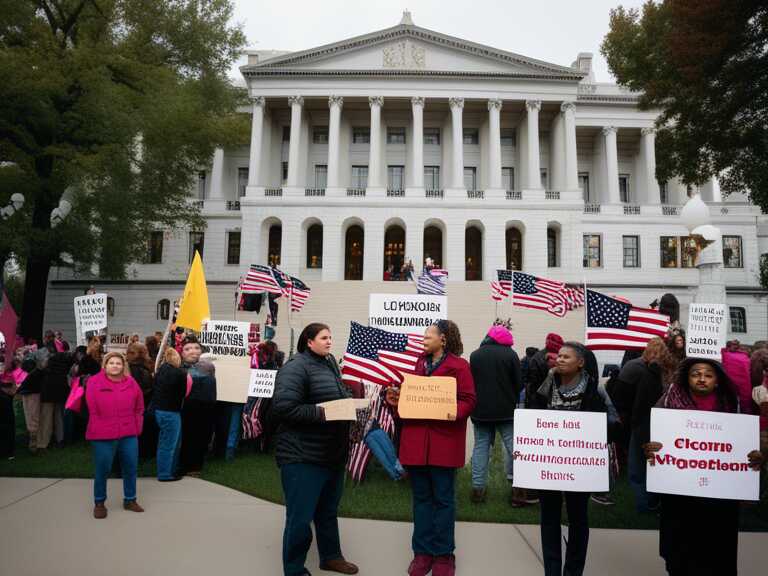
States Channel $500M in Taxpayer Funds to Anti-Abortion Centers Post Roe v. Wade Overturn
States restricting abortion have allocated nearly $500 million in public funds to anti-abortion counseling centers since Roe v. Wade was overturned.

States that impose restrictions on abortion have inundated anti-abortion counseling centers with nearly $500 million in taxpayer funding. This surge in financial support follows the Supreme Court's 2022 decision to overturn Roe v. Wade. A comprehensive report by Equity Forward, a non-profit advocacy group focused on reproductive rights, has brought this issue to light. The organization analyzed budgets from 23 states that dedicate public funding to crisis pregnancy centers, revealing that these states allocated over $1 billion in taxpayer funds to such centers since 1995. Alarmingly, nearly half of this amount, approximately $489 million, was appropriated in the last two years. This substantial financial infusion into anti-abortion counseling centers has raised significant concerns about the intentions and impacts of such funding
The Impact of Crisis Pregnancy Centers
Crisis pregnancy centers provide counseling and support services to pregnant women while aiming to dissuade them from terminating their pregnancies. However, these centers have faced criticism for several reasons. Firstly, many of these anti-abortion counseling centers are not licensed medical facilities, which raises concerns about the credibility of the services they provide. There have been accusations of these centers spreading medical misinformation about abortion risks, potentially compromising the well-being of vulnerable individuals seeking assistance
Financial Support Amid Restrictions
According to the report, many states that have dramatically increased financial support for these groups are the same ones restricting access to abortion. For instance, after Florida passed its six-week abortion ban last year, it allocated $25 million to crisis pregnancy centers, marking a more than five-fold increase from the previous year. Similarly, Tennessee dedicated $20 million to the effort last year, a substantial rise from just $283,000 in the year prior. Even Arkansas and West Virginia, which had not provided any funds to crisis pregnancy centers before 2022, allocated a combined $8 million to these centers. This trend raises questions about the motivations behind the substantial financial support for crisis pregnancy centers, particularly in states where access to abortion services has been curtailed.
Lack of Oversight and Waste
As highlighted by the CBS News and ProPublica investigation in Texas, there are significant concerns regarding the use of taxpayer dollars in these programs. The state agency overseeing the Alternatives to Abortion program, which funnels money to these centers, admitted to lacking safeguards and monitoring over how tens of millions of taxpayer dollars are spent. Such a lack of scrutiny raises serious questions about potential mismanagement and the effective utilization of public funds
Shift in Focus and Funding Prioritization
In response to the Supreme Court's ruling, the Alternatives to Abortion program in Texas underwent a rebranding, shifting its focus from convincing women to continue their pregnancies to providing material support for families in need. Despite the controversies and findings of the CBS News and ProPublica investigation, key supporters of the program, including Texas State Rep. Jeff Leach, expressed their intention to further invest in the initiative. This unwavering support for the program, despite the concerns raised, underscores the contentious nature of the debate surrounding the use of public funds in these centers
Allocation of Federal Funding
In addition to state funding, anti-abortion counseling centers are also receiving substantial federal support. According to a report by Health Management Associates, over $429 million was awarded to more than 650 crisis pregnancy centers from 2017 to 2023. This funding, which came from a variety of sources including the Federal Emergency Management Agency and the Teen Pregnancy Prevention program, adds another layer to the ongoing debate about the allocation of public dollars to these centers.
Political and Social Implications
The use of public funding to support crisis pregnancy centers has become a politically charged issue, with opposing parties taking stark stances on the matter. The Biden administration's proposal to restrict funding for crisis pregnancy centers was met with resistance from House Republicans, highlighting the contentious nature of this issue within the political arena. Moreover, the substantial financial support for these centers in states with conservative leadership and restrictive abortion policies has drawn criticism from advocates for reproductive rights. The allocation of public funds to these centers has become a focal point in the broader discourse on reproductive rights and reproductive health education
Prioritization of Evidence-based Programs
As pointed out by Equity Forward Executive Director Ashley Underwood, the prioritization of funding for anti-abortion counseling centers over evidence-based programs aimed at improving public health outcomes raises significant ethical concerns. The allocation of at least a billion dollars to organizations that lack oversight and accountability has prompted calls for a reevaluation of funding priorities, particularly in light of the pressing need for maternal health improvements and direct support for parents and families
Broader Implications for Reproductive Rights
The widespread allocation of public funds to anti-abortion counseling centers, coupled with the lack of oversight and the dissemination of potentially misleading information, poses fundamental challenges to the landscape of reproductive rights and healthcare access. As the debate over the appropriate use of public resources continues, it is imperative to ensure that funding decisions align with evidence-based practices that prioritize the health and well-being of individuals navigating complex reproductive decisions. The ongoing political and social discourse surrounding this issue will likely shape reproductive rights policy in the United States for years to come
Share news















